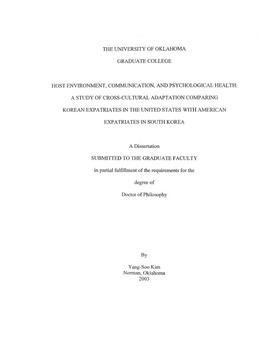| dc.contributor.advisor | Kim, Young Yun, | en_US |
| dc.contributor.author | Kim, Yang Soo. | en_US |
| dc.date.accessioned | 2013-08-16T12:19:15Z | |
| dc.date.available | 2013-08-16T12:19:15Z | |
| dc.date.issued | 2003 | en_US |
| dc.identifier.uri | https://hdl.handle.net/11244/671 | |
| dc.description.abstract | Future studies in this field could prove yet more fruitful by expanding the range of nationalities of the expatriate groups living and working in a variety of cultural regions. (Abstract shortened by UMI.) | en_US |
| dc.description.abstract | Hypothesis 5 predicted that Korean expatriates in the U.S. were likely to experience lower perceived host receptivity than American expatriates in Korea. | en_US |
| dc.description.abstract | Hypothesis 1 predicted a positive association between host communication competence and psychological health, and was supported by statistical data and interview findings. | en_US |
| dc.description.abstract | In addition to communication factors, the study examined the level of pressure to conform to the cultural norms of the host culture. Hypothesis 4 predicted a higher level of perceived host conformity pressure for Korean expatriates in the U.S. than for American expatriates in South Korea. | en_US |
| dc.description.abstract | This study examined communication patterns and forms of cross-cultural adaptation experience in two groups of expatriates. Based on Kim's (2001) communication theory of cross-cultural adaptation, the study sought to understand: (1) the cross-cultural adaptation experiences of Korean expatriates in the U.S. vis-a-vis the American host environment; (2) the cross-cultural adaptation experiences of American workers in South Korea vis-a-vis the Korean host environment; (3) how these two expatriate groups differ in their perceptions of their respective host environments; and (4) how perception of the environment plays a role in adaptation. | en_US |
| dc.description.abstract | Hypothesis 3 predicted a positive association between host mass communication and psychological health. Statistical data supported this hypothesis. | en_US |
| dc.description.abstract | To collect the data, a structured quantitative survey using questionnaires and personal interviews was undertaken with a sample of 211 expatriate workers: 105 American expatriates in South Korea and 106 Korean expatriates in the U.S., between February and August 2002. Each sample group was selected by means of convenience sampling, combined with a snowball sampling technique for the survey and a quota-sampling method for the in-depth personal interviews. | en_US |
| dc.description.abstract | Hypothesis 2 predicted a positive association between host interpersonal communication and psychological health, and was supported by analysis of statistical data and interviews. | en_US |
| dc.description.abstract | The results of the present study verify that Kim's theory can comprehensively explain forms of cross-cultural adaptation on the part of expatriate workers. The relevant hypotheses were generally supported by quantitative and qualitative findings. | en_US |
| dc.format.extent | xvi, 252 leaves : | en_US |
| dc.subject | Americans Cultural assimilation Korea (South) | en_US |
| dc.subject | Psychology, Social. | en_US |
| dc.subject | Social adjustment Korea (South) | en_US |
| dc.subject | Koreans Cultural assimilation United States. | en_US |
| dc.subject | Speech Communication. | en_US |
| dc.subject | Sociology, Ethnic and Racial Studies. | en_US |
| dc.subject | Social adjustment United States. | en_US |
| dc.title | Host environment, communication, and psychological health: A study of cross-cultural adaptation comparing Korean expatriates in the United States with American expatriates in South Korea. | en_US |
| dc.type | Thesis | en_US |
| dc.thesis.degree | Ph.D. | en_US |
| dc.thesis.degreeDiscipline | Department of Communication | en_US |
| dc.note | Source: Dissertation Abstracts International, Volume: 64-10, Section: A, page: 3537. | en_US |
| dc.note | Adviser: Young Yun Kim. | en_US |
| ou.identifier | (UMI)AAI3109066 | en_US |
| ou.group | College of Arts and Sciences::Department of Communication | |
